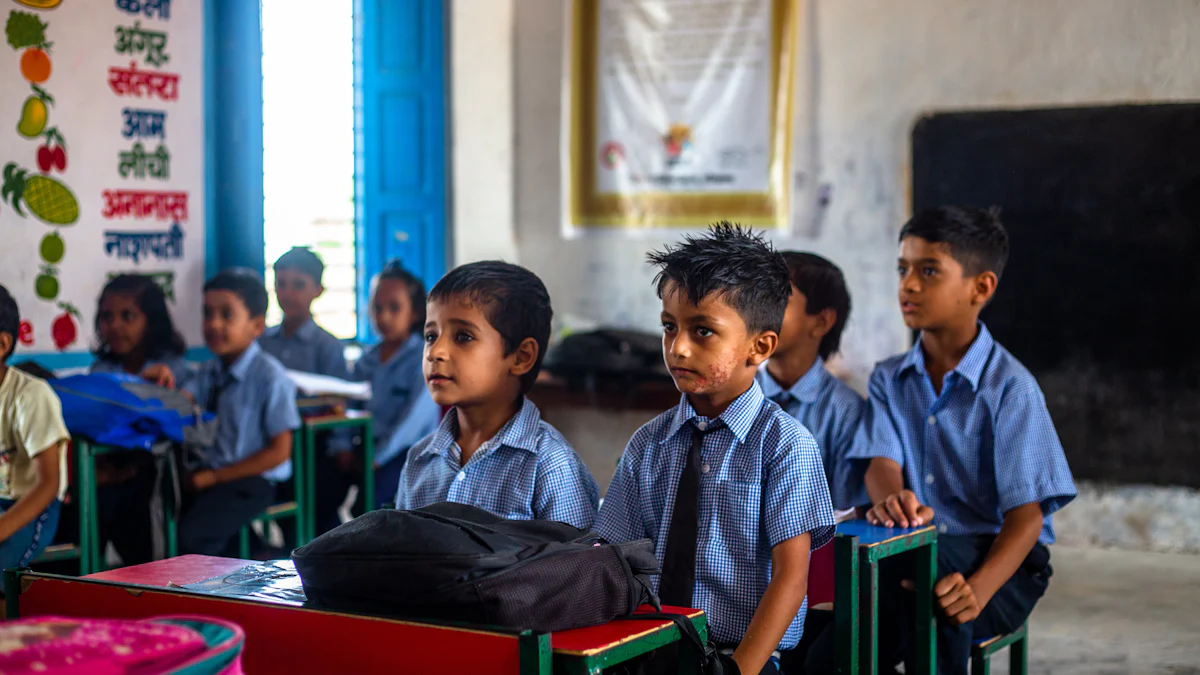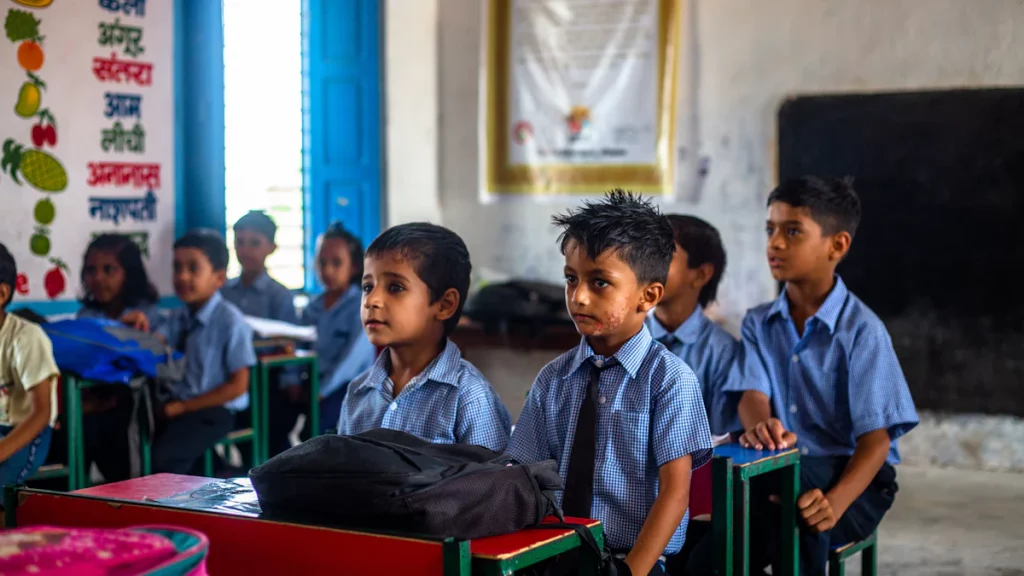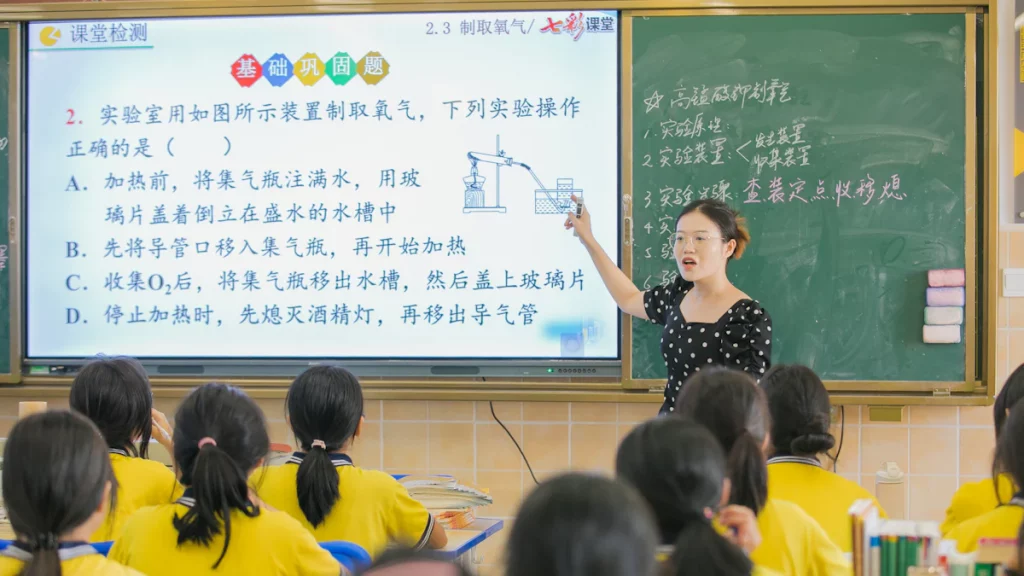
A New Dawn for Indian Education
The National Education Policy (NEP) 2020 marks a significant shift in the landscape of education in India. Understanding the need for change was crucial in formulating this groundbreaking policy, as it aimed to bridge the gap between traditional educational approaches and the evolving needs of students and educators.
The Old vs. The New
In the past, Indian education primarily focused on rote memorization and examination scores, often neglecting holistic skill development and critical thinking. However, with the introduction of NEP 2020, there is a paradigm shift towards a more comprehensive and inclusive approach to learning. The policy emphasizes fostering creativity, innovation, and practical application of knowledge, aligning with the global standards of education.
Voices for Reform
Interviews with school leaders across India have highlighted their readiness to embrace the changes brought about by NEP. They express concerns following the pandemic and are keenly interested in pedagogical advancements that can strengthen students' core concepts. This demonstrates a collective acknowledgment of the necessity for educational reform and an openness to embracing innovative strategies.
The Birth of the National Education Policy
Crafting the NEP involved extensive research, consultation with experts, and insights from various stakeholders in the education sector. It was imperative to address not only current challenges but also anticipate future requirements. The policy's formulation took into account diverse perspectives to ensure its relevance across different educational settings.
Key Goals and Promises
One of the key goals outlined in NEP is to ensure quality teacher recruitment and training. Insights from NIT Uttarakhand emphasize that successful implementation hinges on how effectively educators adopt this new framework. Quality teacher recruitment is pivotal in shaping a progressive learning environment that aligns with outcome-based education principles.
Moreover, NEP introduces continuous professional development (CPD) initiatives for teachers, emphasizing regular training programs and workshops to enhance their pedagogical skills. This underlines a commitment to nurturing competent educators who can effectively implement learner-centric pedagogy aligned with National Professional Standards for Teachers (NPST).
The Core of the National Education Policy
The National Education Policy (NEP) 2020 has emerged as a transformative catalyst for rebuilding India's educational landscape. It represents a monumental shift from traditional approaches to a more holistic and inclusive framework, emphasizing the need for significant changes in the education system. The success or failure of NEP hinges on its adoption by the teaching community, making quality teacher recruitment and training at the heart of this policy.
A Shift in Focus
From Syllabus to Learning Goals
The NEP 2020 advocates for a fundamental shift from focusing solely on completing syllabi to defining clear learning goals. This change aims to foster a deeper understanding of concepts and skills among students, moving away from rote memorization towards comprehensive knowledge acquisition. By prioritizing learning goals, educators can tailor their instruction to meet specific learning outcomes, ensuring a more effective and personalized learning experience for students.
Emphasizing Skills and Attitudes
In alignment with NEP's objectives, there is an increased emphasis on nurturing essential skills and attitudes among students. This includes fostering critical thinking, creativity, problem-solving abilities, and cultivating positive attitudes towards learning. By integrating these aspects into the curriculum, the policy seeks to equip students with practical skills that are crucial for their personal and professional development in the future.
Innovative Pedagogy and Experiential Learning
Bringing Creativity into Classrooms
NEP 2020 encourages innovative pedagogical approaches that prioritize creativity within classrooms. Educators are encouraged to incorporate interactive and engaging teaching methods that stimulate students' imagination and curiosity. By infusing creativity into lessons, students can develop a deeper appreciation for learning while honing their creative thinking skills.
Learning by Doing
Experiential learning forms a cornerstone of NEP's vision for education in India. The policy emphasizes hands-on experiences that allow students to apply theoretical knowledge in real-world contexts. Through project-based assignments, practical experiments, and immersive learning activities, students can gain valuable insights while developing practical skills that extend beyond traditional classroom settings.
The successful implementation of NEP relies heavily on collaborative efforts between educational institutions, external organizations, and policymakers. External organizations play a pivotal role in supporting educational institutions to effectively implement the policy's mandates through pedagogical innovations and multi-organizational collaborations.
At NIT Uttarakhand, there is a holistic embrace of NEP 2020's multidisciplinary approach aimed at fostering innovation and research among students. This approach is instrumental in creating an enlightened workforce capable of addressing national and international challenges through knowledge application.
Overall, NEP 2020 stands as a transformative initiative targeting teacher training programs tailored to meet the challenges of the future. Its learner-centric pedagogy aims to prepare students for the demands of a knowledge-based economy while nurturing critical thinking skills essential for their success in diverse fields.
Transforming Classrooms and Teaching

Training Teachers for the Future
The implementation of the National Education Policy (NEP) 2020 has brought to light the need for equipping educators with new skills to effectively navigate the evolving educational landscape. A recent survey conducted among school owners and leaders in India revealed that 70% of schools feel they are not fully prepared for the implementation of NEP, indicating a pressing need for comprehensive teacher training programs. This underscores the urgency to address the gaps in educator readiness and highlights the significance of targeted training initiatives.
Survey Results:
-
According to a survey focused on readiness with NEP and top concerns following the pandemic, 70% of schools expressed their unpreparedness for implementing NEP.
-
The survey was conducted among school owners and leaders in India.
In response to the impact of the pandemic on teachers, another survey spanning across different regions of India indicated that 65% of teachers feel overburdened, with 92% calling for better training. These statistics underscore the critical need for tailored professional development programs that address the challenges faced by educators in adapting to new pedagogical approaches and managing increased workloads.
Survey Results:
-
A survey on the impact of the pandemic on teachers revealed that 65% feel overburdened, while 92% advocate for improved training.
-
The respondents included teachers from various parts of India.
To address these concerns, NEP emphasizes continuous professional development (CPD) as a cornerstone for enhancing educators' pedagogical skills. This initiative aims to provide regular training programs and workshops designed to equip teachers with innovative teaching methodologies aligned with contemporary educational standards. By prioritizing CPD, NEP endeavors to empower educators with the necessary tools and knowledge to create dynamic learning environments conducive to students' holistic growth.
New Skills for Educators
The transformative nature of NEP necessitates a paradigm shift in educators' skill sets, emphasizing competencies beyond traditional teaching methods. With an eye toward preparing educators for Amrit Kaal 2047's challenges and aspirations, NEP represents a transformative initiative in Indian education. It underscores the importance of fostering a multidisciplinary approach among educators, encouraging them to integrate diverse perspectives into their teaching practices.
In line with this vision, quality teacher recruitment forms an integral component of NEP's strategy. The policy incorporates provisions for professional development training tailored not only for teachers but also heads of schools on a continuous basis. This comprehensive approach acknowledges that effective leadership is pivotal in driving meaningful educational reforms at both institutional and systemic levels.
Survey Results:
-
The survey findings highlight that NEP has components dedicated to professional development training for both teachers and heads of schools on an ongoing basis.
-
While specific demographics were not provided, these insights emphasize NEP's commitment to nurturing competent educators through continuous skill enhancement.
Creating Inclusive and Flexible Learning Environments
School Complexes and Grouping
NEP introduces innovative measures such as forming school complexes or other creative groupings as part of its endeavor to create inclusive learning environments. This approach seeks to foster collaboration among multiple public schools while promoting resource sharing and expertise exchange. By leveraging collective strengths within these groupings, educational institutions can enhance their capacity to deliver high-quality education tailored to diverse student needs.
Strengthening State Open Schools
Furthermore, NEP places emphasis on strengthening State Open Schools as an avenue to cater to young learners who may not have access to physical schooling due to various reasons. By bolstering State Open Schools' infrastructure and resources, NEP aims to ensure equitable access to education across different demographic segments while accommodating individual learning preferences.
The Impact on Students and Learning

The implementation of the National Education Policy (NEP) 2020 is poised to bring about a substantial impact on students' learning outcomes and their preparedness for the demands of the 21st century. By emphasizing holistic education, pedagogical innovations, and multi-organizational collaborations, NEP aims to redefine the educational landscape in India.
Enhanced Learning Outcomes
Measuring Success
Measuring the success of NEP's impact on learning outcomes is crucial for evaluating its effectiveness. It involves assessing students' academic achievements, skill development, and overall growth. A comprehensive framework for assessment will be essential to track progress and identify areas that require further attention. This process will involve analyzing standardized test scores, student portfolios, and qualitative feedback from educators and parents.
Role of External Organizations: External organizations play a significant role in supporting educational institutions to implement NEP 2020 effectively. Their contributions are instrumental in providing resources, expertise, and guidance to enhance learning outcomes across diverse educational settings.
Stories of Transformation
Stories of transformation resulting from NEP's implementation serve as compelling evidence of its impact on students' learning experiences. These narratives highlight instances where students have demonstrated enhanced critical thinking abilities, creativity, and practical skills acquired through experiential learning. Such stories provide valuable insights into the tangible benefits derived from embracing NEP's transformative initiatives.
Transformative Initiative in Indian Education: NEP 2020 represents a transformative initiative in Indian education by targeting teacher training programs tailored to meet the challenges and aspirations of Amrit Kaal 2047. This forward-looking approach aims to equip students with the necessary skills to thrive in an ever-evolving global landscape.
Preparing for the 21st Century
Skills for a New Era
NEP's focus on critical thinking, experiential learning, interactive classrooms, integrated pedagogy, and competency-based education underscores its commitment to preparing students for the demands of the 21st century. By nurturing these essential skills, students are better equipped to navigate complex challenges, think innovatively, and contribute meaningfully to society.
Focus on Critical Thinking: The emphasis on critical thinking within NEP aligns with global trends in education that prioritize developing students' analytical abilities and problem-solving skills. This approach fosters a culture of inquiry and equips students with the capacity to evaluate information critically.
The Role of Technology in Education
Technology plays a pivotal role in facilitating innovative teaching methodologies aligned with NEP's vision for education. Integrating technology into classroom instruction enables personalized learning experiences tailored to individual student needs. Additionally, it promotes digital literacy and equips students with essential technological skills vital for their future endeavors.
Holistic Educational Paradigm: NEP-2020 carries the promise of a holistic educational paradigm that combines theoretical knowledge with practical application while embracing multilingualism amidst rich societal values. This comprehensive approach ensures that students receive a well-rounded education that prepares them for diverse personal and professional pursuits.
Looking Ahead: The Future of Education in India
As the National Education Policy (NEP) 2020 unfolds, ongoing implementation and the challenges it presents are at the forefront of discussions. The road ahead is paved with aspirations for a vibrant knowledge society rooted in Indian ethos, as envisioned by NEP. However, this transformative journey is not without its obstacles.
Ongoing Implementation and Challenges
The Road Ahead
The implementation of NEP involves a comprehensive restructuring of the education system, encompassing primary, secondary, and higher education. This monumental task requires meticulous planning, resource allocation, and stakeholder collaboration to ensure a seamless transition. Real-time evaluation systems and a consultative monitoring framework have been proposed to facilitate an inclusive, participatory, and holistic approach to implementation.
Overcoming Obstacles
While NEP holds promise for educational reform, it also observes possible challenges such as the availability of skilled human resources and the transition time required for full integration. It leans towards enabling technology without fully addressing the need to build capabilities for meaningful engagement with it. These challenges necessitate strategic interventions focused on capacity-building initiatives and targeted skill development programs for educators and students alike.
The Promise of a Brighter Future
Achieving the Goals of NEP
NEP's guiding pillars of Access, Equity, Quality, Affordability, and Accountability lay the foundation for achieving its overarching goals. Major recommendations include school examinations in grades 3, 5, and 8 to provide timely feedback on students' progress. Additionally, there is a focus on language education and classical languages to preserve cultural heritage while promoting multilingualism.
A Vision for Indian Education
NEP lays out a visionary roadmap for changes in teaching methodologies, learning paradigms, and regulatory frameworks across all levels of education. It emphasizes development, sustainability, innovation as essential elements of an inclusive knowledge-based economy. Furthermore, it proposes the establishment of National Professional Standards for Teachers (NPST) to elevate teaching standards and foster mentorship among educators.
The establishment of Higher Education Commission of India (HECI) aims to create a uniform regulatory system that ensures equitable standards across public and private higher education institutions. This common regulatory framework seeks to provide equal opportunities for all institutions in terms of regulation, accreditation processes, and standard-setting.
Experts stress the imperative need to empower students with digital literacy skills essential for thriving in the digital era. They also discuss the impact of NEP-2020 on management education while highlighting the requirement for integrating technology into curriculum design and assessment processes.
In conclusion,
the future holds immense potential as NEP-2020 charts a course toward an equitable educational landscape deeply rooted in Indian values while embracing global best practices.
By integrating these provisions into policy frameworks,
India can pave the way towards nurturing empowered learners equipped with critical thinking skills,
digital fluency,
and cultural awareness necessary to thrive in an ever-evolving world.
This vision encompasses not only academic excellence but also holistic personal development,
laying a strong foundation for India's journey towards becoming a vibrant knowledge society.



